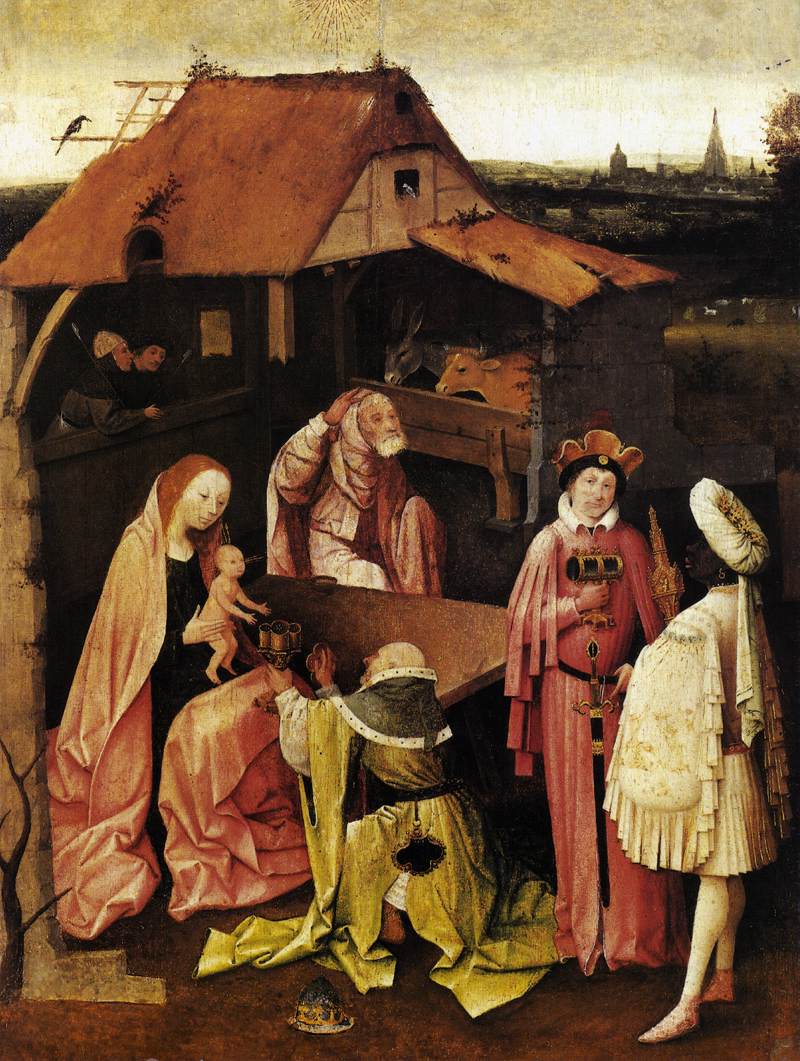
Bosch’s Epiphany, 1495
Michael Dolzani’s first post has drawn a couple of thoughtful responses:
Matthew Griffin:
Thanks so much for this piece. It’s proven quite helpful to me, as I try to come up with some coherent thoughts for a pair of Epiphany sermons.
Epiphany is one of the principal feasts of the Church year, and celebrates the greater spread of God’s saving work beyond just the Israelites. It’s the time of year when we read the account in the gospel of Matthew of the magi coming to see the child, led by a star–and I think that one could argue that such is the quintessential example of natural religion (and then absorbed into Christianity). After all, the magi follow a star and bring tribute, ill-understanding (in the gospel writer’s eyes, at any rate) the full import of who they were meeting.
Where I would want to offer nuance to your argument is around the assertion that “the imgaination does not ‘believe in God’: belief is concerned with the evidence for or against objects, and God is not an object.” I think my quibble stems from a passage of scripture close to Frye’s heart–”Now faith is the substance of things hoped for, the conviction of things unseen” (Hebrews 11.1). In fact, it was a passage that kept cropping up in papers given at the Frye & the Word conference a few years back, and it’s key to my own reading of Frye: he’s sure that faith isn’t, as he quotes “believing what you know ain’t so”–but is something other than factual, other than straight subject/object dichotomy. It’s how Frye does this that makes Words with Power such an important book in my life, and I thank you for reminding me of that as I try to think about what it means to help others re-read a myth that reveals something of how God is.
Clayton Chrusch:
The passage that Matthew identifies is the same one that I think could use some clarification. God (the Father) may not be an object, but he is, according to the view I am defending anyway, a subject, and subjects (like the human mind, for example) are still facts, and their existence can be treated (more or less) in the same way the existence of objects can be treated. According to the Christian view, God, in the person of Jesus, is actually an object, in the sense of a physical entity. But perhaps you are not contrasting objects with subjects but objects with persons. Persons, though, are also facts, and we can believe in them both in the sense of acknowledging their existence and also in the sense of trusting them.
I certainly understand Blake’s rebelliousness and share his disgust with the church which contents itself with being at best a little less bad than institutions of a similar size, wealth, and power. But I see a distinction between the church and the teachings it espouses, the teachings, in fact, that it usually betrays. And I also see a distinction between the teachings of the church, in all their inadequacy and perversion, and the truth of which they are a distortion.
So I don’t see imagination and fact as incompatible. An imaginative scientist is very good at coming up with theories that articulate and explain facts. An imaginative Christian is very good at envisioning what it means to be a God whose only motive is love and also what it means to be a child of such a God. But a vision may be a vision of what is real. The imagination shows us not only what is not true, but also what is true.
I think I misspoke in my original comment by suggesting that the hope of Christians is the end of suffering. The end of suffering is only a secondary Christian hope, but the primary one is equally factual. Suffering is bearable, but what I cannot bear, what makes me want to pluck out my own eyes or throw myself off a cliff is being bad–hurting other people or behaving dishonestly. If I hate torture, it is not because it is painful but because it reaches down into a person’s will and takes possession of it for evil purposes. If I really knew that I could be good and remain good, I would not be afraid of any amount of pain. This is not something I am making up as an ideal, but something that is a part of real life to Tibetan monks, for example, being tortured in Chinese prisons.
And so I don’t see salvation as admittance into a very pleasant place, but as a renovation of the will so complete and so secure that it doesn’t matter any longer what place we are in.
